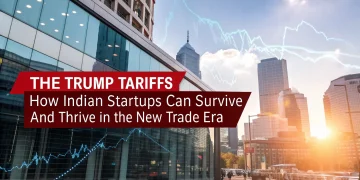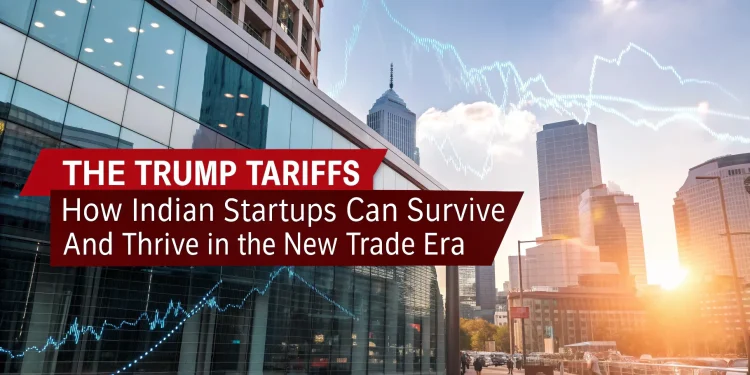Trump Tariffs on Indian exports are a major turning point for global trade relations. These tariffs, which are meant to protect U.S. industry, have a far-reaching impact on India’s economy. This is not only a story about disruption, but also a lesson on resilience, adaptability and innovation for Indian entrepreneurs and startups. This article explores the most affected sectors, highlights statistical data and provides insights on how entrepreneurs could leverage this moment to find new opportunities, diversify their markets and build sustainable ventures.
Understanding Trump Tariffs
Trump’s tariffs are primarily aimed at industries in which India is a competitive exporter of goods to the U.S. This includes industries that require a lot of labor, such as apparel and leather, but also industries with higher value, like steel, chemicals and engineering goods. Tariffs on Indian exports make them less competitive with exports from other nations such as Vietnam and Bangladesh. Nevertheless, there are exemptions for certain sectors, such as IT and pharmaceuticals, which continue their strong performance.
Related: Trade Challenges 2025: India’s Steel Industry Faces U.S. Export Barriers

The sectors most affected by tariffs
- Textiles and apparel: India’s textiles and apparel exports into the U.S. are a significant contributor to this $40+ billion industry. Tariffs have reduced the competitiveness of small and medium businesses, which has led to millions of lost jobs.
- Leather and Footwear: Exports of leather and footwear, valued at $5 billion per year, are facing reduced demand due to tariffs that push U.S. customers towards other markets.
- Steel and Metals: Tariffs reduce India’s share of U.S. imports.
- Chemicals and dyes: Some organic and specialty chemical products, particularly those exported from Gujarat and Maharashtra, are subject to increased tariffs.
- Engineering Goods: Indian exports of engineering goods, from auto components to machines, are suffering a decline, affecting MSMEs in particular.
View our Books for more Information
The Impact of Tariffs on Statistics
- The textile and apparel sector accounts for nearly 28 percent of India’s total imports from the U.S.
- The leather and footwear industry exports $5 billion per year, with the U.S. being heavily dependent.
- The leather and footwear industry exports $5 billion per year, with the U.S. being heavily dependent.
- The demand for engineering goods has decreased.
- The targeted tariffs will affect chemical exports worth $22 billion.
- The U.S. steel exports account for 15% of the total exports. This is a large gap.
Related: Trump’s Tariffs on India Have Just Created These 5 New Business Opportunities
Exempted and resilient sectors
Not all industries are affected equally. Pharmaceuticals, India’s largest export to America, worth $25 billion, are exempt. IT services, which contribute over $50 billion annually to the U.S. economy, are also exempt. Agrochemicals and other raw materials vital to the U.S. industrial sector continue to flow.
Opportunities for Entrepreneurs
While disruptive, Trump’s tariffs offer several new opportunities for Indian startups.
- Import substitution of products for which India is no longer competitive.
- Diversification of exports to emerging markets such as Africa, Southeast Asia and Europe.
- The development of new industries, such as bio-based agrochemicals and technical textiles.
- Adopt e-commerce models and direct-to consumer models to bypass traditional trading dependencies.
How NPCS Supports Entrepreneurs During Trade Disruptions
Niir Project Consultancy Services provides professional consulting services for the preparation and submission of detailed techno-economic feasibility reports (DPRs).
Our reports include:
- Manufacturing process in detail
- Demand and market research
- Process flow diagrams
- Product mix and Capacity Planning
- Raw material and machinery details
- Complete project financials, including profitability analysis
We aim to assist entrepreneurs in evaluating industrial projects for feasibility, profitability and scalability.
New Business Opportunities in Sectors
- Startups are able to explore the local market and export markets of specialty chemicals. This is a lucrative opportunity for entrepreneurs, as the industry grows at a CAGR of 9-10%.
- Technical Textiles: As traditional textiles are under pressure, technical textiles like geotextiles and medical fabrics offer untapped potential.
- Global demand for eco-friendly, vegan leather is increasing. Investors can invest into plant-based alternatives or lab-grown leather to serve global customers.
- Agrochemicals & Food Processing: Exempted from tariffs, agrochemicals are still attractive. Startups in food processing can tap into global demand for packaged, organic and ready-to-eat foods.
- Digital and Ecommerce Ventures: Ecommerce allows you to bypass tariff-related obstacles. Indian startups can build global brands using platforms such as Amazon Global, Alibaba and direct online sales.
For more information check out our related video
Indian business tycoons: Inspiration for you
India’s business leaders provide valuable lessons on resilience in the face of disruption.
- Mukesh Amanani (Reliance Industries), diversified into digital and telecom services, redefining the business model.
- Ratan Tata (Tata Group), built global businesses by combining innovation with strategic acquisitions.
- Kiran Mazumdar Shaw (Biocon): India became a biotech center by focusing on affordability, research and innovation.
- Uday Kotak, Kotak Mahindra Bank: Demonstrated strategic growth in the financial sector.
These journeys highlight the importance of vision, innovation, and adaptability in creating globally relevant businesses.
Find Your Perfect Business Match Using Our Smart Startup Selector
The conclusion of the article is:
Trump’s tariffs against Indian exports are both a threat and an opportunity. While sectors like textiles, leather and engineering goods are facing setbacks in the current economic climate, industries such as pharmaceuticals and IT service providers provide a balance. Innovation, diversification and market adaptability are the keys to success for startups. Indian entrepreneurs can turn disruption into growth by tapping into new markets and exploring sustainable alternatives. They can also leverage digital platforms. With the help of NPCS, and with inspiration from India’s top business tycoons as well, the road to resilience and profitability is wide open.


















